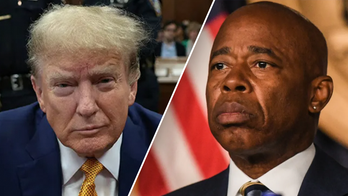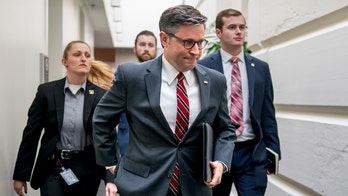With Iraq Emphasis, Obama Reminds Liberals of Happier Times
“I am a friend to all countries. A friend of America; a friend of Russia; a friend of Iran; a friend of Turkey; and a friend of the Arabs…”
-- Iraqi Prime Minister Nouri al Maliki in an interview with the Wall Street Journal.
Barack Obama’s improbable rise to the presidency was launched by a speech he gave in October 2002 opposing the Iraq war. Today, Obama is trying to revive his re-election bid as he brings the conflict to an end.
In his famous “dumb war” speech given at an anti-war rally in Chicago, then-state Sen. Obama praised justifiable conflicts but denounced the gathering Iraq invasion as a cynical calculation by George W. Bush and the oil industry. It was raw, red meat.
“What I am opposed to is the attempt by political hacks like Karl Rove to distract us from a rise in the uninsured, a rise in the poverty rate, a drop in the median income - to distract us from corporate scandals and a stock market that has just gone through the worst month since the Great Depression,” Obama said.
Remember, this was just 13 months after the September 11 attacks. Leading Democrats like Hillary Clinton and John Kerry were concerned about Bush’s sky-high popularity and looking soft on terrorists in a country then singing along with Toby Keith: “We’ll put a boot in your ass, it’s the American way.”
Kerry would eventually beat anti-war opponent Howard Dean, whose view was much closer to Obama’s than the cautions straddle adopted by the Massachusetts Senator or the former first lady. But the Democratic base was embittered by the process and blamed Kerry’s waffling ways for the failure. Obama, by then running for the U.S. Senate, was granted the keynote speech at the 2004 convention as a nod from the more moderate Kerry camp to the heartbreak of the anti-war crowd.
Obama took that speaking spot, his new toned-down, centrist-sounding rhetoric and the gift of a self-destructing Republican challenger and won the spot. When Clinton, even more moderate than Kerry, came along, the activist left was keen to avoid a repeat of what had happened in 2004 and were not going to allow someone who voted to authorize the use of force in Iraq to again be the nominee.
There’s an analogy to what the Republicans are going through now on bailouts. While the TARP program was a Republican invention, opposition to it has become a litmus test for conservative activists. Candidate McCain’s decision to embrace the plan was a deep disappointment to the right and now the GOP 2012 contenders all try to outdo each other in their repudiations of the policy. The closest thing to a defense, offered by Mitt Romney and Herman Cain, amounts to this: it seemed like a good idea at the time.
Of course, Democrats in 2004 still thought that Iraq and national security would be a big deal in the election in which Republicans looked likely to either nominate hero Mayor Rudy Giuliani or war hero and Iraq surge proponent John McCain. The election ended up being about sub-prime mortgages, roasted 401(k) accounts and fears of another Great Depression. Who knew?
It was good news for Obama, because had the election been on foreign and military issues, he might well have gotten beat. His European tour and promises of engagement without preconditions for enemy states played into McCain’s strength as a pragmatic hawk. But when AIG hit the panic button and Wall Street masters of the universe started wetting their Armanis, the 72-year-old former POW and first-term governor of Alaska looked unsuitable for the job. Obama looked steadier and, since he had been talking more about domestic issues and the economy all along, better prepared.
The 2012 election is in large part about the hangover from the Panic of 2012 and the mistakes made during the crisis and in its aftermath. Republicans may nominate the guy who would have best been able to push back against Obama from the 2008 crop – financial tycoon Mitt Romney – or they might be so repulsed by the crisis response of the Republican establishment to bail out and stimulate that they will insist on anybody but Romney.
But the 2012 election is also a little about Iraq.
Obama has been a disappointment to the liberals who got him elected. The government is still wiretapping, still detaining terror suspects at Guantanamo Bay and now using drones to expand what once was known as the Global War on Terror. There are now 70,000 more troops in Afghanistan than when Obama took office.
On domestic issues, Obama is frequently accused of passivity and timidity by deep-blue voters who see his health law as a Frankenstein’s monster of bad policies stitched together and his inability to bend even a Democrat-dominated Congress to his will as evidence of either callowness or a lack of commitment to their movement. Obama’s vulnerability on this issue was on display Sunday night with his favorite interviewer, CBS’ Steve Kroft, when Obama protested, “I didn’t overpromise,” but he knows he kind of did, and so do his liberal supporters.
But they will always have Iraq.
As Obama welcomes Iraqi Prime Minister Nouri al Maliki to the White House today, he is entering the home stretch of an effort to claim credit for ending the war in Iraq. Although the U.S. drawdown has essentially followed the timetable set President Bush and been far slower than Kerry promised as a candidate, Obama’s message to the left is that he is delivering on the promise he made to its members way back in 2002. Plus, liberals know that a Republican would have left some troops in Iraq, garrisoned to discourage Iranian meddling.
But, Obama also must be subtle about his victory lap. The region is very ardently going to hell and the Iranians are quite pleased about it. They are loving the status that their cold war with the U.S. is bringing doing everything they can to destabilize U.S. interests across the Muslim world. The Arab Spring might have better been called the Iranian Spring.
Obama, who started his national career as an anti-war figure, knows the danger of being seen as weak or appeasing, hence the bloody scalp brandishing: “Ask Usama bin Laden…” With American allies losing ground in the region to Islamists and their Iranian backers and the war in Afghanistan heading for a very unhappy season, what with the nuclear-armed Pakistanis freaking out, this is not a great time for Obama to point out his political roots as the anti-war candidate.
The message, restated again and again from the president and his campaign is: “I promised to bring the troops home and I did it.” And if the whole region doesn’t blow up in the next 11 months, it may work out for him.
But with Baghdad looking to Tehran, not Washington or even Riyadh, in its battle to hold on to Kurd-controlled oil fields and maintain order, the next year may be a tumultuous one.




